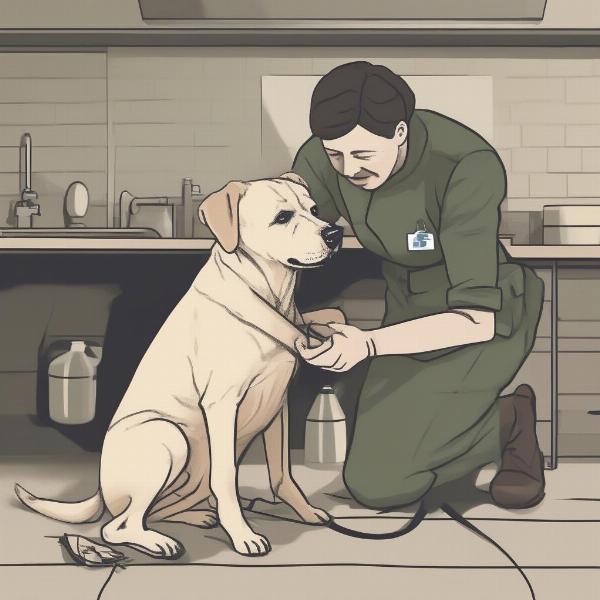Finding the right tick and flea treatment for your furry friend in South Africa can be overwhelming, given the numerous options available. This comprehensive guide will help you navigate the market and choose the best tick and flea protection for your dog, keeping them happy, healthy, and parasite-free. We’ll explore various treatments, discuss their effectiveness, and address common concerns, ensuring you’re well-equipped to make an informed decision.
Understanding the Tick and Flea Threat in South Africa
South Africa’s warm climate makes it an ideal breeding ground for ticks and fleas, posing a significant threat to dogs. These parasites not only cause itching and discomfort but can also transmit serious diseases like tick bite fever, babesiosis, and ehrlichiosis. Choosing an effective preventative treatment is crucial for protecting your dog’s health.
Different Types of Tick and Flea Treatments for Dogs
Several types of tick and flea treatments are available in South Africa, each with its pros and cons. Understanding the differences will help you select the most suitable option for your dog’s lifestyle and needs.
Spot-on Treatments
Spot-on treatments are applied directly to your dog’s skin, usually on the back between the shoulder blades. They distribute the active ingredient through the skin’s oils, providing long-lasting protection.
Oral Medications
Oral medications come in the form of chewable tablets or pills that are administered monthly. These treatments work systemically, killing fleas and ticks from the inside out.
Tick and Flea Collars
Collars impregnated with insecticides offer continuous protection against parasites. They release the active ingredient slowly over time, repelling and killing ticks and fleas.
Shampoos and Sprays
Shampoos and sprays provide immediate relief from existing infestations but offer relatively short-term protection. They are often used in conjunction with other preventative measures.
Choosing the Right Treatment for Your Dog
Selecting the best tick and flea treatment depends on several factors, including your dog’s age, breed, size, lifestyle, and any existing health conditions. Consulting with a veterinarian is recommended to determine the most appropriate and safe option.
Considerations for Puppies and Pregnant/Lactating Dogs
Puppies and pregnant or lactating dogs have specific sensitivities, requiring specialized treatments. Always consult your veterinarian before using any tick and flea product on these vulnerable groups.
Addressing Environmental Control
Alongside treating your dog, environmental control plays a vital role in managing tick and flea infestations. Regularly cleaning your home, washing bedding, and treating your yard can significantly reduce parasite populations.
 Veterinarian examining a dog for ticks and fleas
Veterinarian examining a dog for ticks and fleas
Popular Tick and Flea Treatments in South Africa
Several reputable brands offer effective tick and flea treatments in South Africa. Some popular options include Bravecto, Frontline Plus, NexGard, and Seresto collars. Researching these products and discussing them with your vet will help you make the best choice.
Comparing Effectiveness and Safety
Each treatment has a different mechanism of action and level of effectiveness. Understanding the potential side effects and safety profiles is crucial for making an informed decision.
Preventing Tick-Borne Diseases
Tick-borne diseases are a serious concern in South Africa. While tick and flea treatments can help reduce the risk, it’s important to be aware of the signs and symptoms of these illnesses and seek veterinary attention promptly if you suspect your dog is infected.
Conclusion
Protecting your dog from ticks and fleas in South Africa requires a comprehensive approach. By understanding the available treatment options, considering your dog’s individual needs, and consulting with your veterinarian, you can provide the best possible protection and ensure your furry companion enjoys a healthy, parasite-free life. Remember to regularly re-evaluate your chosen treatment and adjust as necessary to maintain optimal protection throughout the year.
FAQ
- How often should I treat my dog for ticks and fleas? The frequency of treatment depends on the product used. Some provide monthly protection, while others last longer. Follow the manufacturer’s instructions and consult your veterinarian.
- What are the signs of a tick-borne illness in my dog? Symptoms can vary depending on the disease but may include fever, lethargy, loss of appetite, joint pain, and swollen lymph nodes.
- Are tick and flea treatments safe for puppies? Not all treatments are safe for puppies. Consult your veterinarian to determine the appropriate product and dosage.
- Can I use human tick and flea products on my dog? Never use human products on your dog. They can be toxic and even fatal. Always use products specifically formulated for dogs.
- How can I prevent ticks and fleas in my home? Regular cleaning, vacuuming, washing bedding, and treating your yard can help control tick and flea populations.
- What should I do if my dog has a tick embedded in its skin? Use fine-tipped tweezers to grasp the tick as close to the skin as possible and pull straight out. Clean the area with antiseptic.
- Are there natural tick and flea remedies for dogs? While some natural remedies exist, their effectiveness may vary. Consult your veterinarian before using any natural treatments.
ILM Dog is a leading international dog website dedicated to providing expert advice on all aspects of dog care and well-being. From breed selection and health care to training and nutrition, we offer a wealth of reliable information for dog owners worldwide. Our team of experienced writers and veterinary professionals is committed to providing practical and up-to-date guidance to help you give your furry friend the best possible care. For expert advice on dog health, training, nutrition, and more, contact us at [email protected] or call us at +44 20-3965-8624. Visit ILM Dog for more information.